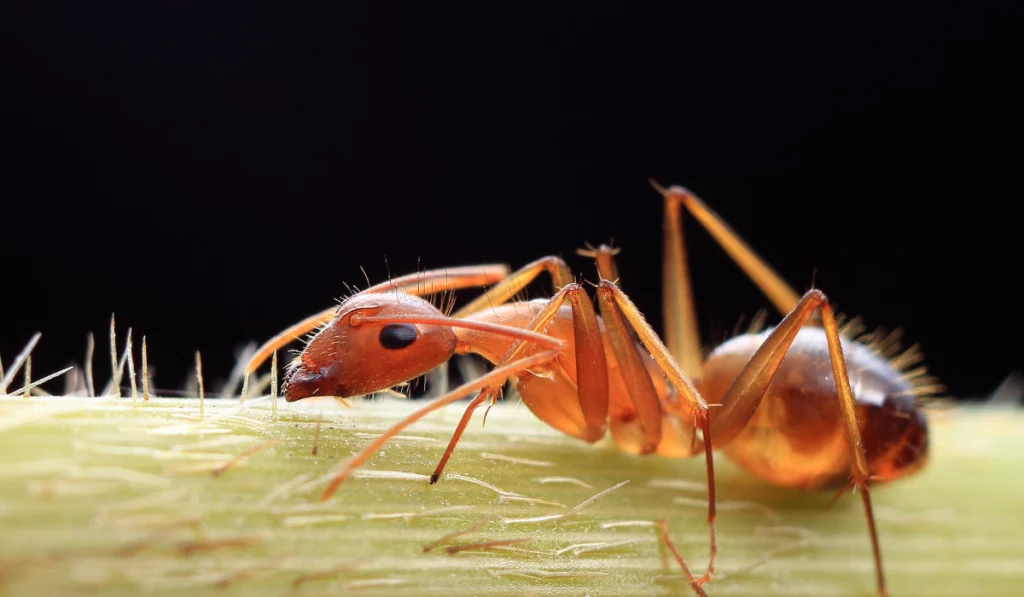Are Ant Bites Venomous? Here’s What to Know
Imagine delighting in a delightful sunny picnic, only to be rudely interrupted by a sharp, burning sensation from an unexpected ant bite. Next thing you think – are ant bites venomous? What symptoms can one expect, and how should they be treated?
This article delves into the world of ant bites, exploring their venom, the causes of stings, and the different types of bites. Let’s ensure that your next outdoor adventure remains untainted by these formidable creatures!
Key Takeaways
- Understanding the types of ants that bite can help in their identification and effective pest control, especially if you’re dealing with an infestation in your home.
- Ant bites can result in a range of symptoms, from immediate pain, redness, and swelling to the formation of blisters and bumps and even allergic reactions.
- Cleaning the bite area, applying a cold compress, using topical treatments, avoiding scratching, and taking OTC medication can help alleviate pain and prevent complications like infection or allergies.
- If your symptoms persist over a few days, worsen, or you experience severe allergic reactions, seek immediate medical attention.
– – –
🐜 Get ant control in Sacramento County or San Diego County
Ant infestations will not go away on their own
Contact Us Now To Get Rid Of Them
– – –
Are Ant Bites Venomous?
Certain types of ant bites are venomous. While most ant species are harmless to humans, some, like the fire ant bites (Solenopsis invicta), can deliver a painful sting. This sting injects a venom primarily composed of Solenopsin, which can cause allergic reactions in some individuals.
Venomous ant bites can range from a mild burning sensation to severe systemic reactions leading to anaphylaxis, a life-threatening allergic reaction needing immediate medical attention. Therefore, understanding which ants bite and how to treat those bites is crucial, especially for homeowners dealing with an infestation.
What Causes Ant Bites to Sting?
Ant bites sting due to venom or formic acid injection into the skin. Ants use their mandibles (jaws) and stingers to defend themselves and attack, but not all ants have stingers.
For instance, fire ants, known for their fierce bites, latch onto the skin with their mandibles and inject venom from their stinger. This venom, composed primarily of Solenopsin, triggers a burning sensation – hence the name, ‘fire ant.’ The Schmidt Sting Index, a pain scale rating for insect stings, rates fire ant stings as about 1 out of 4. So mildly alarming but overall manageable.
What Types of Ants Bite?

Not all ants bite, and they shouldn’t be confused with termites, which are a different insect altogether. But some common species are known for their painful stings. Here are a few:
- Fire Ants (Solenopsis invicta): Predominantly found in the Southern United States (e.g., Alabama or Texas, but also California), Fire Ants are aggressive, and their bites cause immediate burning and itching, usually developing into a blister. You definitely want to avoid fire ant venom!
- Bulldog Ants (Myrmecia): Indigenous to Australia, Bulldog Ants are highly aggressive and have a painful sting, leading to severe localized pain and swelling.
- Carpenter Ants (Camponotus): These ants are found worldwide but are an especially common pest in the United States. While they can bite when threatened, they rarely sting humans.
- Harvester Ants (Pogonomyrmex): Primarily found in the desert regions of the U.S., their sting is excruciating and can cause allergic reactions in some individuals.
- Bullet Ants (Paraponera clavata): Found in South America, Bullet Ants have the most painful recorded sting of any insect, likened to being shot, according to the Schmidt Sting Pain Index.
Symptoms of Ant Bites
Ant bites, especially from venomous species, can result in a wide range of symptoms. Here’s what you might experience:
- Immediate Pain: The first symptom of an ant bite is often immediate pain at the sting site. The intensity may vary depending on the species of ant.
- Redness and Swelling: A common reaction to ant venom, you’ll likely notice redness and swelling around the bite. This can last for a few hours to several days.
- Blisters and Pustules: Species like fire ants often cause the formation of a pus-filled blister or pustule. This usually appears within a few hours of the bite.
- Itching: Itching is a common symptom that may persist for days after the bite. Scratching should be avoided as it can lead to infection.
- Allergic Reactions: While less common, some individuals may experience allergic reactions to ant venom, including hives, face or throat swelling, rapid heartbeat, difficulty breathing, and, in severe cases, anaphylaxis.
- Infection: If a bite is not cleaned and cared for properly, it can become infected. Signs of infection include increased redness, swelling, pain, and pus.
– – –
🐜 Get ant control in Sacramento County or San Diego County
Ant infestations will not go away on their own
Contact Us Now To Get Rid Of Them
– – –
How to Treat Ant Bites Effectively
Treating ant bites promptly and correctly can alleviate pain and prevent complications like infection or allergic reactions. Here are some first-aid steps you can take if been bitten:
- Clean the Bite Area: As soon as you’ve been bitten, wash the area thoroughly with soap and warm water. This helps to remove any traces of venom and reduces the risk of infection.
- Apply a Cold Compress: Use a cold compress or cloth-wrapped ice pack on the bite area to reduce swelling and numbness. Remember, do not apply ice directly to skin or welts.
- Use Topical Treatments: Apply an over-the-counter topical treatment like hydrocortisone cream or calamine lotion to help soothe the itchiness and reduce swelling.
- Avoid Scratching: It’s natural to want to scratch an itchy bite, but this can break the skin and introduce bacteria, leading to infection. Try your best to avoid scratching.
- Take Over-the-counter Medication: Consider taking an over-the-counter pain reliever, oral antihistamine, or even corticosteroids if the pain or itchiness is severe.
- Monitor Symptoms: Keep an eye on your symptoms. If your symptoms worsen or you start to experience signs of an allergic reaction like chest pain, difficulty breathing, or face and throat swelling, seek immediate medical attention.
Remember, if symptoms persist over a few days or you experience severe anaphylactic reactions, consult a healthcare provider for your ant or insect bites. It’s the safest bet to take. And always consider ant control services to prevent future outbreaks as well.



